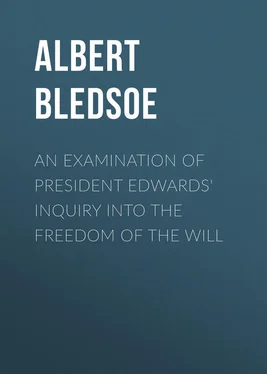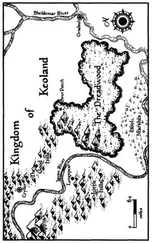Albert Bledsoe - An Examination of President Edwards' Inquiry into the Freedom of the Will
Здесь есть возможность читать онлайн «Albert Bledsoe - An Examination of President Edwards' Inquiry into the Freedom of the Will» — ознакомительный отрывок электронной книги совершенно бесплатно, а после прочтения отрывка купить полную версию. В некоторых случаях можно слушать аудио, скачать через торрент в формате fb2 и присутствует краткое содержание. ISBN: , Издательство: Иностранный паблик, Жанр: foreign_antique, foreign_prose, на английском языке. Описание произведения, (предисловие) а так же отзывы посетителей доступны на портале библиотеки ЛибКат.
- Название:An Examination of President Edwards' Inquiry into the Freedom of the Will
- Автор:
- Издательство:Иностранный паблик
- Жанр:
- Год:неизвестен
- ISBN:http://www.gutenberg.org/ebooks/35839
- Рейтинг книги:4 / 5. Голосов: 1
-
Избранное:Добавить в избранное
- Отзывы:
-
Ваша оценка:
- 80
- 1
- 2
- 3
- 4
- 5
An Examination of President Edwards' Inquiry into the Freedom of the Will: краткое содержание, описание и аннотация
Предлагаем к чтению аннотацию, описание, краткое содержание или предисловие (зависит от того, что написал сам автор книги «An Examination of President Edwards' Inquiry into the Freedom of the Will»). Если вы не нашли необходимую информацию о книге — напишите в комментариях, мы постараемся отыскать её.
An Examination of President Edwards' Inquiry into the Freedom of the Will — читать онлайн ознакомительный отрывок
Ниже представлен текст книги, разбитый по страницам. Система сохранения места последней прочитанной страницы, позволяет с удобством читать онлайн бесплатно книгу «An Examination of President Edwards' Inquiry into the Freedom of the Will», без необходимости каждый раз заново искать на чём Вы остановились. Поставьте закладку, и сможете в любой момент перейти на страницу, на которой закончили чтение.
Интервал:
Закладка:
After all, it may be said, that Edwards himself did not really consider these two things as distinct, but only as different aspects of the same thing. If so, it will follow, that when he undertook to establish his own scheme, he represented motive as the cause of volition; and yet when he was reminded, that the activity of the nature of the soul is the cause of its actions, he replied, that although this may be very true, yet this activity of nature is not the “cause why its acts are thus and thus limited, directed and determined.” He replied that the question is not so much , “How a spirit comes to act,” as why it acts thus, and not otherwise. That is to say, it will follow, that he chose to build up his scheme under one aspect of it, and to defend it under another aspect thereof; that as the architect of his system, he chose to assume and occupy the position, that motive is the cause of volition itself; yet as the defender of it, he sometimes preferred to present this same position under the far milder aspect, that although “the activity of spirit, may be the cause why it acts,” yet motive is the cause why its acts are thus and thus limited, &c. In other words, it will follow, that his doctrine possesses two faces; and that with the one it looks sternly on the scheme of necessity, whilst, with the other, it seems to smile on its adversaries.
The truth is, the great question which President Edwards discusses throughout the Inquiry, as we shall see, is “How a spirit comes to act;” and the other question, “why its action is thus and thus limited,” &c., which, on occasion, swells out into such immense importance, as to seem to cover the whole field of vision, generally shrinks down into comparative insignificance. As a general thing, he goes along in the even tenor of his way, to prove that no event can begin to be without a cause of its existence; and, in particular, that no volition can come into existence without being caused to do so by motive; and it is only when it is urged upon him, that “a spirit endowed with activity” may give rise to its own acts, that he takes a sudden turn and reminds us, that the question is not so much “how a spirit comes to act?” as “why its acts are thus and thus limited?”
From the supposition made by Edwards, that “if activity of nature be the cause why a spirit acts,” it has been concluded that he regarded the soul of man as the efficient cause of its volitions, and motive as merely the occasion on which they are put forth or exerted. But surely, those who have so understood the Inquiry, have done so very unadvisedly, and have but little reason to complain, as they are prone to do, that his opponents do not understand him. If Edwards makes mind the efficient cause of volition, what becomes of his famous argument against the self-determining power, by which he reduces it to the absurdity of an infinite series of volitions? “If the mind causes its volition,” says he, “it can do so only by a preceding volition; and so on ad infinitum .” Is not all this true, on the supposition that the mind is the efficient cause of volition? And if so, how can any reader of Edwards, who does not wish to make either his author or himself appear ridiculous, seriously contend that he holds mind to be the efficient, or producing cause of volition? There be pretended followers and blind admirers of President Edwards, who, knowing but little of his work themselves, are ever ready to defend him, whensoever attacked, even by those who have devoted years to the study of the Inquiry, by most ignorantly and flippantly declaring that they do not understand him. These pseudo-disciples will not listen to the charge, that Edwards makes the strongest motive the producing cause of volition; but whether this charge be true or not, we shall see in the following section.
SECTION II.
OF EDWARDS’ USE OF THE TERM CAUSE
We have already seen that Edwards must be understood as holding motive to be the cause of volition; but still we cannot make up the issue with him, until we have ascertained in what sense he employs the term cause . It has been contended, by high authority, that he did not regard motive as the efficient, or producing cause of volition, but only as the occasion or condition on which volition is produced. Hence, it becomes necessary to examine this point, and to settle the meaning of the author, in order that I may not be supposed to misrepresent him, and to dispute with him only about words.
The above notion is based on the following passage:
“I would explain,” says President Edwards, “how I would be understood when I use the word cause in this discourse; since, for want of a better word, I shall have occasion to use it in a sense which is more extensive, than that in which it is sometimes used. The word is often used in so restrained a sense as to signify only that which has a positive efficiency or influence to produce a thing, or bring it to pass. But there are many things which have no such positive productive influence; which yet are causes in this respect, that they have truly the nature of a reason why some things are, rather than others; or why they are thus rather than otherwise.”… “I sometimes use the word Cause , in this Inquiry, to signify any antecedent, either natural or moral… upon which an event so depends, that it is the ground or reason, either in whole or in part, why it is, rather than not; or why it is as it is, rather than otherwise; or, in other words, any antecedent with which a consequent event is so connected, that it truly belongs to the reason why the proposition which affirms that event, is true; whether it has any positive influence, or not . And, agreeably to this, I sometimes use the term effect for the consequence of another thing, which is perhaps rather an occasion than cause, most properly speaking.” And he tells us, that “I am the more careful thus to explain my meaning, that I may cut off occasion, from any that might seek occasion to cavil and object against some things which I may say concerning the dependence of all things which come to pass, on some cause, and their connection with their cause,” p. 50-1.
This is the portion of the Inquiry on which the younger Edwards founds his conclusion, that his father did not regard motive as the efficient cause of volition, but only as the occasion, or condition, or antecedent of volition. He finds this language in the Essays of Dr. West; “We cannot agree with Mr. Edwards in his assertion, that motive is the cause of volition;” and he replies, “Mr. Edwards has very particularly informed us in what sense he uses the term cause ;” and, in proof of this, he proceeds to quote a portion of the above extracts from the Inquiry. Having done this, he triumphantly demands, “Now, does Dr. West deny, that motive is an antecedent, on which volition, either in whole or in part depends? or that it is a ground or reason, either in whole or in part, either by positive influence or not, why it is rather than not? Surely, he cannot with consistency deny this, since he says, ‘By motive we understand the occasion , end or design, which an agent has in view when he acts.’ So that, however desirous Dr. West may be to be thought to differ, in this point, from President Edwards, it appears that he most exactly agrees with him,” p. 65.
Now, if Edwards really believed that motive is merely the occasion on which the mind acts, agreeing herein most perfectly with Dr. West, why did he not say so? Why adhere to the term cause, which can only obscure such an idea, instead of adopting the word occasion, or condition, or antecedent, which would have clearly expressed it? Surely, if Edwards maintained the doctrine ascribed to him, he has been most unfortunate in his manner of setting it forth; it is a great pity he did not give it a more conspicuous place in his system. It is to be regretted, that he has not once told us that such was his doctrine, in order that we might see for ourselves his agreement with Dr. West in this respect, instead of leaving it to the initiated few to enlighten us on this subject.
Читать дальшеИнтервал:
Закладка:
Похожие книги на «An Examination of President Edwards' Inquiry into the Freedom of the Will»
Представляем Вашему вниманию похожие книги на «An Examination of President Edwards' Inquiry into the Freedom of the Will» списком для выбора. Мы отобрали схожую по названию и смыслу литературу в надежде предоставить читателям больше вариантов отыскать новые, интересные, ещё непрочитанные произведения.
Обсуждение, отзывы о книге «An Examination of President Edwards' Inquiry into the Freedom of the Will» и просто собственные мнения читателей. Оставьте ваши комментарии, напишите, что Вы думаете о произведении, его смысле или главных героях. Укажите что конкретно понравилось, а что нет, и почему Вы так считаете.












